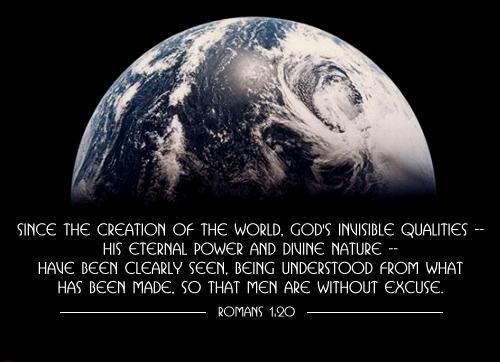 The essential duty of all men at all times is unchanging. It is important to understand, however, that the specific applications of this duty have not been made equally clear to all mean at all times. In fact, the outworkings of what it means - in terms of concrete actions - to love God supremely and to love one's neighbor as oneself have been revealed more and more clearly over time and have differed under varying circumstances.
The essential duty of all men at all times is unchanging. It is important to understand, however, that the specific applications of this duty have not been made equally clear to all mean at all times. In fact, the outworkings of what it means - in terms of concrete actions - to love God supremely and to love one's neighbor as oneself have been revealed more and more clearly over time and have differed under varying circumstances.
For the Gentile - the man without the Bible - they have been revealed only by way of nature and conscience - "the work of the Law written in the heart" (Romans 2:14-16)
When Paul describes Gentiles as "those who are without law," (1 Cor 9:21) he does not mean this in a absolute sense. Though they have never seen a Bible or heard the Ten Commandments, Gentiles nevertheless have an intimate knowledge of God and of right and wrong. When a poisonous snake attached itself to Paul's hand on the island of Malta, the natives said, "Undoubtedly this man is a murderer, and though he has been saved from the sea, justice has not allowed him to live." (Acts 28:1-6). How did they know that murder was wrong, and how did they know that "justice" required murder to be punished by the death of the offender? According to Paul, they knew this because of "the work of the Law written on their hearts." "For when Gentiles who do not have the Law do instinctively the things of the Law, these, not having the Law, are a law to themselves, in that they show the work of the Law written in their hearts, their conscience bearing witness, and their thoughts alternately accusing or else defending them, on the day when, according to my gospel, God will judge the secrets of men through Jesus Christ." (Rom. 2:14-16)
When Gentiles "do instinctively the things of the Law," it is the essence of the law that is being manifested as "written on their hearts." Men know by nature that they should not do things to their neighbors that they would not want done to themselves. They know, for example, that they should not deceive, steal from, and murder their neighbors - i.e.., they know that they should love them.(Rom 13:9-10) This is why some form of the "Golden Rule" is found in all of the major world religions. In the same way, men know by nature that they should love and glorify God, and they know in their consciences that they have fallen short of this obligation. Eloquent testimony is borne to this inescapable knowledge every time the blood of a chicken is offered on a heathen altar to propitiate an angry "god,"
Though it has been greatly defaced by sin, man's knowledge of right and wrong is one of the most indelible aspects of his having been made in "the image of God." Long after his conscience has been "seared as with a branding iron" (1 Tim 4:2) and he has come to the place of "calling evil good and good evil," (Isaiah 5:20) man still retains this innate knowledge in the depths of his being. It is an inescapable part of his basic makeup. Paul makes this clear in the first chapter of his letter to the Romans, where he sets forth the condemnation of "the man without the Bible." After describing in verses 21-31 the corruption of those whom God has "given over" (Romans 1:24,26,28) to the lowest reaches of depravity, he concludes by saying that even those who have sunk to this state still "know the ordinance of God, that those who practice such things are worthy of death." This is a remarkable statement! Apart from any special revelation from God (e.g.., the Bible), all men nevertheless "know the ordinance of God" that those who practice "such things" as sexual immorality, homosexuality, unrighteousness, wickedness, greed, envy, murder, strife, deceit, malice, gossip, slander, hatred of God, insolence, arrogance, boasting, invention of evil, disobedience to parents, untrustworthiness, and lack of love and mercy, are "worthy of death"! (Rom 1:32).
Long before the Law of Moses was ever given, God held men accountable for sinning against the work of the Law written on their consciences. For example, God destroyed the entire earth in the days of Noah because "the wickedness of man was great on the earth, and ... every intent of the thoughts of his heart was only evil continually." (Genesis 6:5). The cities of Sodom and Gomorrah were likewise destroyed for sinning against nature (Genesis 18:20-19:25) by practicing things they knew (Genesis 19:7) were wrong.
By Charles Leiter, from The Law of Christ, pp 130-133
